The governance approach of smart city initiatives. Evidence from Trondheim, Bergen, and Bodø
Peer reviewed, Journal article
Published version

Åpne
Permanent lenke
https://hdl.handle.net/11250/2668296Utgivelsesdato
2020Metadata
Vis full innførselSamlinger
Originalversjon
Gohari, S., Ahlers, D., Nielsen, B. F. & Junker, E. (2020). The governance approach of smart city initiatives. Evidence from Trondheim, Bergen, and Bodø. Infrastructures, 5(4). doi: 10.3390/infrastructures5040031Sammendrag
A pragmatic and polity-focused solution for governing a smart city in the direction of sustainability is still missing in theory and practice. A debate about whether a smart city is a pragmatic solution for modern challenges or just a technology-led urban utopia is entangled with the vexed issue of governance. While ‘smart governance’ has drawn unprecedented interest, the combination of its conceptual vagueness and broad applications couple with a lack of focus on its underlying international and local political paradigms have raised concerns about its utility. This study contributes to restoring attention to the original concept of governance, its differences with governing and government, and the potential challenges resulting from its functionality in its real, multi-layered, and complex contexts. This paper explores the intellectual connection between governance and smart cities, from both an empirical and a conceptual/analytical perspective. From the empirical side, we examine which actors, processes, and relational mechanisms at different levels that have had an impact on the initiation of smart cities in three Norwegian cities: Trondheim, Bergen, and Bodø. We illustrate how the structural sources of the interests, roles, and power in smart city initiatives have caused governance to emerge and change, but have also affected the goals designed by specific actors.
